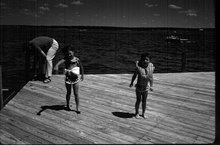
Rilke with Lou Andreas-Salomé (1897) On the balcony of the summer house of the family Andreas. (near München: left to right: Professor Andreas, August Endell, Rilke and Lou Andreas-Salomé.)
We had gone down to the water’s edge, the dog and I, where reflected light flecked and danced against the underside of leaves, heavy boughs leaning far over the surface of the water--every now and again watching a leaf drift in swirls along the current, or a fluff of cottonwood seed floating softy down to land, suspended like a breath on the tension of the surface. I was thinking of Rilke, and his inability to reconcile the beauty he beheld with the world of the living, meanwhile, the world of the living intruded into the lazy afternoon, the dog’s and mine, as irreverent voices rose over the whisper of leaves in the breeze, a boom box, dogs barking.
Like my grandfather and great grandfather, I had long ago learned to know and navigate the less-trod paths and hidden places, and it wasn’t long before we plunged deeper in the foliage along a shaded, narrow trail. Our asylum was tentative, for along the path there was evidence of others’ passage--cairns poised on a moss-covered boulder, oddly shaped rocks lodged precipitously on the tips of what remained of a trunk struck by lightning--little prayers flung out before us, mute witnesses of something far more vast than these frail human faculties could perceive or hold.
We found a ravine and followed it back to the water, and again took a spot on a smooth, flat rock. The voices were fainter now, even pleasant, humbled by the sound of a small waterfall. As my vision shifted between the surface and depths of the water, I thought of the girl. Is this what she becomes? A woman jealously guarding the sacred groves? I mused, watching a dragonfly hover on the tip of a spire of Indian grass--does she one day let go of her fascination with the spectres of the past, the ghosts that slip in and out of time whispering their secrets in her ear as she dreams? The desolate expanse of the landscapes of her childhood had carved out a core of silence inside of her, an empty vessel. She watched and watched the world and between the world, and wandered amid the lines of poetry even as she sought to intuit the footfalls of a dead poet's perambulations through Prospect Park. There was no separation between the simple word, “cup” and its physical correspondence and the mythical shattering vessel that released the divine light embedded and concealed within the world. Every utterance was ambiguous and vast, as impenetrable as it was unconscious. Perhaps we are here, the poet says, in order to say: house, bridge, fountain, gate, pitcher, fruit-tree, window--
Perhaps she comes to know the eminent power of the unsayable, and retrieves her stillness from the hammers our heart endures. Despite that, will she still be able to praise?
What good [God?] is poetry if it dissolves the ligaments between one another, if we build walls that sever sacred landscapes? She will always love Rilke, this much I know, and she will forgive, utterly, his excesses. But she will never quit the real work--the work of water coursing over rocks, and dragonflies hovering, and dogs barking--she will not quit the real work of love.



